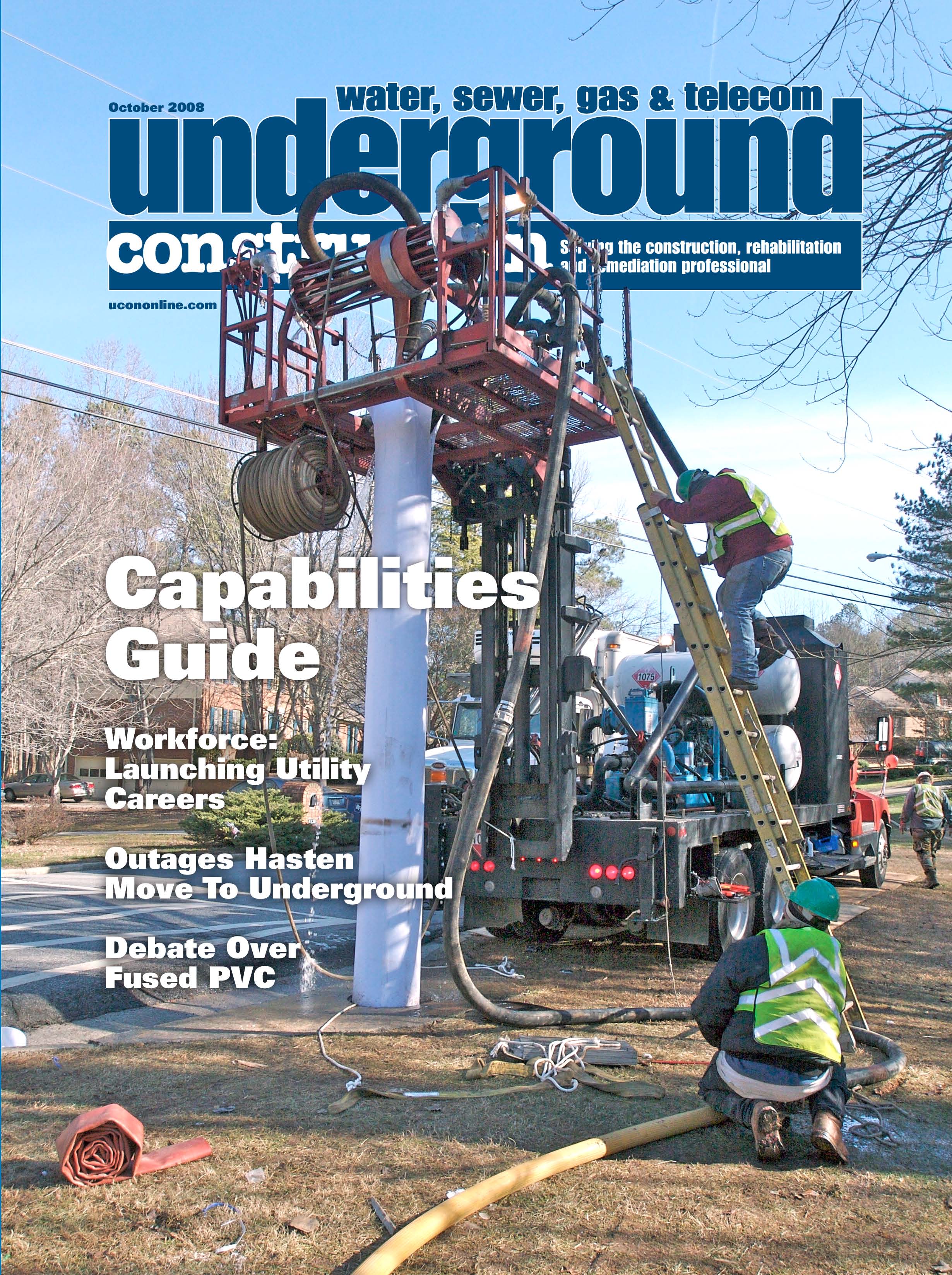
October 2008 Vol. 63 No. 10
Editor's Log
In October 2005, I wrote about our experience with Hurricane Rita. Unfortunately, it’s time to discuss another hurricane.
Features
One of the best ways to minimize the effects of a shortage of qualified workers is to plan ahead.
General
One of the issues raised following the retraction of the Plastics Pipe Institute (PPI) press release regarding alleged problems with fused PVC pipe is the role of PPI in the plastic pipe industry. PPI positions itself as representing all of the industry. In its response to the PPI press release, Underground Solutions Inc. (UGSI) claimed PPI devotes its efforts to promoting HDPE pipe products.
In August, Underground Construction magazine and other industry publications received this brief editorial "bulletin": "The Plastics Pipe Institute retracts its news release dated June 11, 2008, and its contents therein." There was no mention of what the June 11 press release was about or a summary of what it contained.
Installing a half mile of underground fiber-optic cable isn’t an unusual job for telecommunications contractor Americom Technology Inc. But when a maze of oil pipelines crisscrossing the cable route adds complexity, difficulty and possible danger to an otherwise routine project, Americom turns to hydro excavation technology to get the job done quickly and safely.
Trenchless Construction Services L.L.C. of Arlington, WA, is a prime example of a true trenchless contractor. Over the last decade, the company has grown from a small HDD crew into a multi-disciplined trenchless company.
Washington Watch
With Congress almost certain to pass a bill revising or eliminating its longstanding ban on offshore oil and gas drilling, interstate natural gas pipelines are trying to insure that any bill does not include an amendment setting up a national commission which would examine the adequacy of current federal policies governing the siting of natural gas infrastructure.
While distribution companies and state regulators seem to be satisfied with the general outlines of the proposed distribution integrity management program (DIMP) announced on June 25 by the Pipeline and Hazardous Materials Safety Administration (PHMSA), a number of questions are being raised by both groups about some of the proposal's murky details.
Pushed by a decision by a federal appeals court, the Occupational Safety and Health Administration (OSHA) wants to make changes in its respirator and training standards which will allow it to assess a penalty on a company on a per employee violation basis. A decision by the U.S. Court of Appeals for the Fifth Circuit in 2005 said OSHA went beyond the language of those two standards in fining a Houston construction company for 11 violations of the asbestos standard, based on the fact that the company did not provide 11 employees with respirators or training for removing asbestos.
Newsline
For over 60 years, Melfred Borzall’s directional drilling and horizontal earth boring tools have been identified by their signature red color. Now, those red tools are turning green.
Business
For years, electric and telecommunications cables to new residential, business and industrial developments have been placed underground where they are protected from wind storms, ice and other weather related risks.

- Glenfarne Alaska LNG targets late-2026 construction start for 807-mile pipeline project
- U.S. water reuse boom to fuel $47 billion in infrastructure spending through 2035
- $2.3 billion approved to construct 236-mile Texas-to-Gulf gas pipeline
- Major water pipe break in Puerto Rico hits over 165,000 customers
- Potomac River Tunnel project enters construction phase beneath Washington, D.C.
- Pennsylvania American Water launches interactive map to identify, replace lead water service lines
- Trump's tariffs drive $33 million cost increase for Cincinnati sewer project
- Utah city launches historic $70 million tunnel project using box jacking under active rail line
- Tulsa residents warned after sewer lines damaged by boring work
- Fatal trench collapse halts sewer construction in Massachusetts; two workers hospitalized


